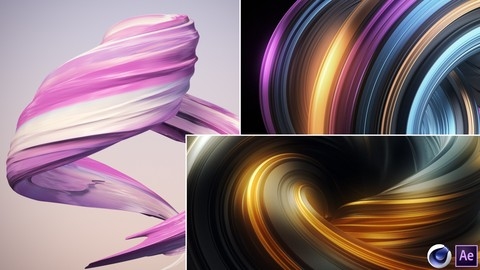Cinema 4D is a powerful and versatile 3D modeling, animation, and rendering software used by professionals across various industries, from film and game development to architecture and product design.
Mastering Cinema 4D can open up a world of creative possibilities, allowing you to bring your wildest ideas to life in stunning detail.
Whether you’re aspiring to create breathtaking visual effects, design intricate 3D models, or craft captivating animations, learning Cinema 4D can equip you with the skills and knowledge to achieve your creative goals.
However, navigating the vast landscape of online courses and finding the right one to guide you on your Cinema 4D journey can feel overwhelming.
You’re searching for a course that not only covers the fundamentals but also provides practical, hands-on experience to solidify your understanding and build a strong foundation.
You need a course that’s engaging, well-structured, and taught by experienced instructors who can demystify complex concepts and empower you to create your own amazing 3D projects.
After careful consideration and review of numerous Cinema 4D courses on Udemy, we’ve identified Cinema 4D Masterclass: The Ultimate Guide for Beginners as the best overall course.
This comprehensive course provides a thorough introduction to the software, guiding you step-by-step through the essential tools and techniques.
It’s packed with practical exercises, allowing you to build a solid foundation and gain the confidence to tackle your own creative projects.
The instructor’s clear explanations and engaging teaching style make learning Cinema 4D an enjoyable and rewarding experience.
While Cinema 4D Masterclass: The Ultimate Guide for Beginners is our top recommendation, we understand that you might be looking for a course that caters to specific interests or skill levels.
That’s why we’ve compiled a list of other exceptional Cinema 4D courses on Udemy, each with its own unique strengths and focus.
So, keep reading to explore our curated selection and discover the perfect course to launch your Cinema 4D adventure!
Cinema 4D Masterclass: The Ultimate Guide for Beginners
This Cinema 4D Masterclass guides you through every step of mastering 3D graphics, even if you’re starting from scratch.
You’ll begin by getting comfortable with Cinema 4D’s interface, learning how to navigate its layout and tailor it to your preferences.
You’ll then discover the power of parametric objects—the core building blocks of your 3D creations.
You’ll learn how to manipulate these objects using essential tools like Move, Scale, and Rotate, and discover how to combine them into more complex designs, even constructing a table and chair from scratch.
You’ll then explore the world of editable objects, unlocking the ability to customize your creations with incredible detail.
This course introduces you to tools like the Knife, Extrude, and Extrude Inner, each providing unique ways to sculpt and refine your 3D forms.
You’ll also learn how to create intricate designs using splines, which allow you to generate everything from organic curves to precise text, even importing designs directly from Adobe Illustrator.
This course guides you through powerful techniques like Sweep, Loft, and Lathe, significantly expanding your creative toolkit.
You’ll also become well-versed in using deformers, mastering tools like Bend, Squash & Stretch, and Wrap to breathe life and dynamism into your models.
You’ll explore the fascinating world of animation, learning how to use keyframes to control movement, rotation, and even the camera itself.
This course demystifies the timeline and dope sheet, allowing you to fine-tune every frame of your animations to achieve professional-level smoothness and timing.
You’ll discover how to create compelling, dynamic motion by applying principles like easing and squash and stretch, making your animations burst with personality.
You’ll then dive into the world of dynamics, learning how to add realistic physics to your creations.
This course breaks down the concepts of rigid bodies, gravity, and collisions, allowing you to create simulations like a bowling alley.
Finally, you’ll unlock the power of MoGraph, a toolset famous for generating complex and mesmerizing motion graphics.
You’ll learn how to use cloners and effectors, opening up a world of possibilities for creating everything from abstract designs to character animation.
Learning Maxon Cinema 4D - A Beginners Training Course
This course equips you with a strong foundation in Cinema 4D, a powerful 3D modeling, animation, and rendering software.
You begin with the fundamentals—understanding the interface, navigating viewports, and setting up projects.
You then learn about object hierarchy, coordinate systems, and basic manipulation techniques.
The course guides you through building a chair, solidifying your grasp of 3D objects and their attributes.
You explore splines, learning to draw, modify, and use them for creating intricate shapes.
The course delves into procedural splines, spline masks, and integration with Adobe Illustrator, showcasing the versatility of this tool.
You then transition to polygonal modeling, a core aspect of 3D modeling.
You learn about vertices, edges, polygons, and techniques like extruding, beveling, and bridging to create complex models.
Lighting and materials breathe life into your models, and this course covers them thoroughly.
You’ll learn about various light types, including the Sky object, and understand concepts like global illumination, physical sky, and ambient occlusion.
You’ll delve into materials, exploring different types, projection methods, and the use of textures for added realism.
The course doesn’t neglect animation, a crucial aspect of 3D design.
You master keyframes, the Powerslider, and the F Curve Manager for creating seamless animations.
You explore path animation, camera morphing, and motion camera techniques, adding dynamism to your scenes.
Rendering is covered in detail, focusing on render settings and multipass rendering, a technique for achieving high-quality output.
Finally, you dive into Mograph, a powerful toolset within Cinema 4D for creating complex animations and simulations.
You learn about the Cloner, Random Effector, Motext, and Dynamics, enabling you to generate stunning visual effects.
This course culminates in building a robot model, allowing you to apply your learned skills.
You’ll model individual parts, apply materials, and see how everything comes together in a tangible project.
Cinema 4D Complete : Vol. 1 The Essentials
This Cinema 4D course takes you from the basics to modeling a complete 3D object.
You start with the interface, learning both the traditional and newer R25 layouts so you can follow any tutorial.
You master the Object Manager for organizing projects, and the Attribute Manager for modifying your objects’ properties, like name, color, and position.
You then dive into 3D modeling with primitives - basic shapes like cubes and spheres.
You discover generators, powerful tools for making complex shapes quickly, such as arrays and booleans.
You also learn to manipulate these objects: moving, scaling, rotating, and aligning them with precision using grids and snapping tools.
The course utilizes a practical approach, guiding you step-by-step through creating a flying saucer model.
You build the main body, add details like antennas and headlights, and even use Cinema 4D Lite for specific tasks, like generating the grid pattern for the exhaust vents.
Learn Cinema 4D - Create Abstract 3D Design Elements
This course on abstract 3D design in Cinema 4D is perfect if you want to bring your creative visions to life.
You will begin by getting comfortable with Cinema 4D’s interface.
You quickly move into hands-on projects where you will learn to manipulate different shapes and objects to create stunning visuals.
Imagine taking a simple shape like a torus and adding ridges and details using tools like the Displacer, Phong Tag, and Subdivision Surface.
You will learn how to use these tools to create complex textures and manipulate the level of detail, giving you complete control over your designs.
To make your creations even more realistic, you will explore 3-point lighting techniques and learn how to create convincing reflections.
You will then dive into more advanced projects, like wrapping a capsule object around a spline to generate unique forms or using splines to craft landscapes and paint strokes.
Along the way, you will master the art of creating wrinkles with the Displacer, adjusting render settings, and understanding the importance of spline smoothness and order of operations in Cinema 4D.
You will discover how to breathe life into your creations by learning how to animate objects to create a seamless loop, using tools like the Sweep Object and splines.
Imagine your designs smoothly transitioning and flowing, adding a whole new dimension to your work.
The course doesn’t just teach you the technical skills; it shows you how to present your work in the best possible light.
You will learn professional techniques for framing your shots using cameras, lighting, and texturing to enhance your 3D designs.
You will also explore how to use Hardware OpenGL to preview your animations, ensuring they are perfect before rendering.
Finally, you will learn how to polish your work in After Effects, adding the finishing touches with color grading and mastering the export process using Adobe Media Encoder.
Cinema 4D Complete : Vol. 2. All about Modeling!
This Cinema 4D course will take you from polygon basics to modeling mastery.
You will begin with the fundamentals of polygons, exploring types like N-Gones and techniques for manipulating points, edges, and faces.
You will also dive into selection tools like Grow, Shrink, and Connected, mastering techniques like Loop, Ring, Outline, Path, and Fill selections for precise model control.
As you advance, you will learn how to place and orient axes, utilize Soft Selection for smooth transitions, and create detailed Vertex Maps for advanced manipulation.
Next, you will unlock the power of splines.
You’ll discover how to create, edit, and combine splines to form complex shapes, using tools such as the Arc, Rounding, and Magnet commands.
The course guides you through techniques like projecting splines onto surfaces and importing them from Illustrator, expanding your modeling versatility.
You will then uncover the magic of generators, using tools like Extrude, Lathe, Sweep, Loft, and Metaballs to build complex geometry effortlessly.
You will learn about interpolation, explore the Caps panel, and master advanced options like Rail and Scale/Rotation for even greater creative control.
The course then takes you deeper into polygon commands, teaching you techniques for optimizing, subdividing, splitting, and refining models.
You will become proficient in techniques like Extrude, Smooth Shift, Matrix Extrude, and master the Bevel tool for intricate detailing.
You will discover the power of Deformers, exploring Bend, Twist, Bulge, Taper, Shear, and Freeform Deformers for organic modeling.
You’ll learn how to use Mesh, Correction, Melt, Shatter, and Explosion Deformers for advanced effects and delve into OpenVDB for creating intricate models.
Finally, you will put your knowledge into practice through workshops, creating objects ranging from simple shapes to intricate designs.
You will learn how to set up reference images, master the art of cutting holes, and bring your modeling skills to a professional level.
Redshift for Cinema 4D Masterclass
This Redshift for Cinema 4D Masterclass equips you with professional rendering skills.
You will begin by exploring the Redshift RenderView and customizing your workspace.
You will learn to use Redshift Lights, including Area Lights, Point Lights, Spot Lights, and Dome Lights, to illuminate your 3D scenes.
The course teaches you how to build a Sun and Sky Rig and create realistic 3-Point Lighting setups for professional results.
You will dive into Redshift Materials, learning to create and apply them to your models, manipulate properties like reflection and refraction, and understand sub-surface scattering.
You will use the Shader Graph and Nodes Editor, adding effects like noise and bump to your materials to create realistic textures.
The Redshift Camera Tag will help you master depth of field effects and achieve the sought-after bokeh effect.
The course will guide you through the nuances of rendering with Redshift.
You will understand the difference between progressive and bucket rendering, utilize real-time previews to make informed creative decisions, and learn how to optimize your renders for both speed and quality.
You will explore advanced topics like global illumination, denoising, and motion blur, mastering techniques like using snapshots and the Redshift Object Tag for intricate shadow interactions.
Finally, you will learn to enhance your renders with post-production effects for polished, professional-quality visuals.
Professional Lighting Techniques in Cinema 4D
This course begins by teaching you the difference between real lights and digital lights in Cinema 4D.
You will learn how to set up your scenes, including building seamless backdrops.
The course then dives into different lighting techniques.
You practice using the default light and explore a variety of light types, including spotlights, area lights, and physically-based lights.
You learn to use the three-point lighting technique.
Plus, you discover how to improve the quality of your renders using PBR lights.
You then explore techniques that create exciting visual effects.
You learn to create volumetric lights and use them to add depth to text.
You will master creating realistic renders using global illumination and ambient occlusion.
You even learn how to use objects as light sources.
You will develop your skills even further with advanced techniques.
You learn to light with high dynamic range images (HDRIs) to add realism and depth.
The course also covers how to use gobos to create dramatic lighting and caustics to create stunning reflections.
Each section includes a quiz to test your knowledge.
Cinema 4D Complete : Vol. 3 Unleash the power of Mograph!
This course takes you on a journey into the heart of Cinema 4D’s powerful motion graphics toolset: Mograph.
Starting with the fundamentals, you’ll explore the Cloner object and its different modes, like Linear, Radial, and Grid Array, learning how to easily multiply and arrange objects in 3D space.
You’ll master techniques for distributing these clones onto surfaces, splines, and even particles, giving you endless possibilities for creating complex and visually stunning animations.
You’ll then dive into the world of Effectors, the tools that breathe life into your Mograph creations.
The course explains how to wield the power of Effectors like the Random Effector, which introduces controlled chaos, the Delay Effector for creating offset animations, and the powerful Push Apart Effector to control the proximity of your clones.
You’ll even explore using sound to drive animations with the Sound Effector, opening up a whole new world of creative possibilities.
Beyond Effectors, you’ll discover the magic of Fields, which act like invisible forces that influence your Mograph objects.
You’ll explore a variety of Fields, including the Spline Field for constraining movement along paths, the Radial Field for creating circular patterns, and the Volume Object Field for influencing clones based on the shape of other objects.
You’ll also learn how to combine Effectors and Fields, creating intricate relationships that result in captivating animations.
The course doesn’t just stop at theory; it equips you with practical skills through workshops designed to solidify your learning.
You’ll work on real-world projects like modeling and animating a clock, creating a realistic tumbling domino effect, and even building a LEGO reveal animation.
Through these hands-on exercises, you’ll gain the confidence to tackle your own creative projects.








